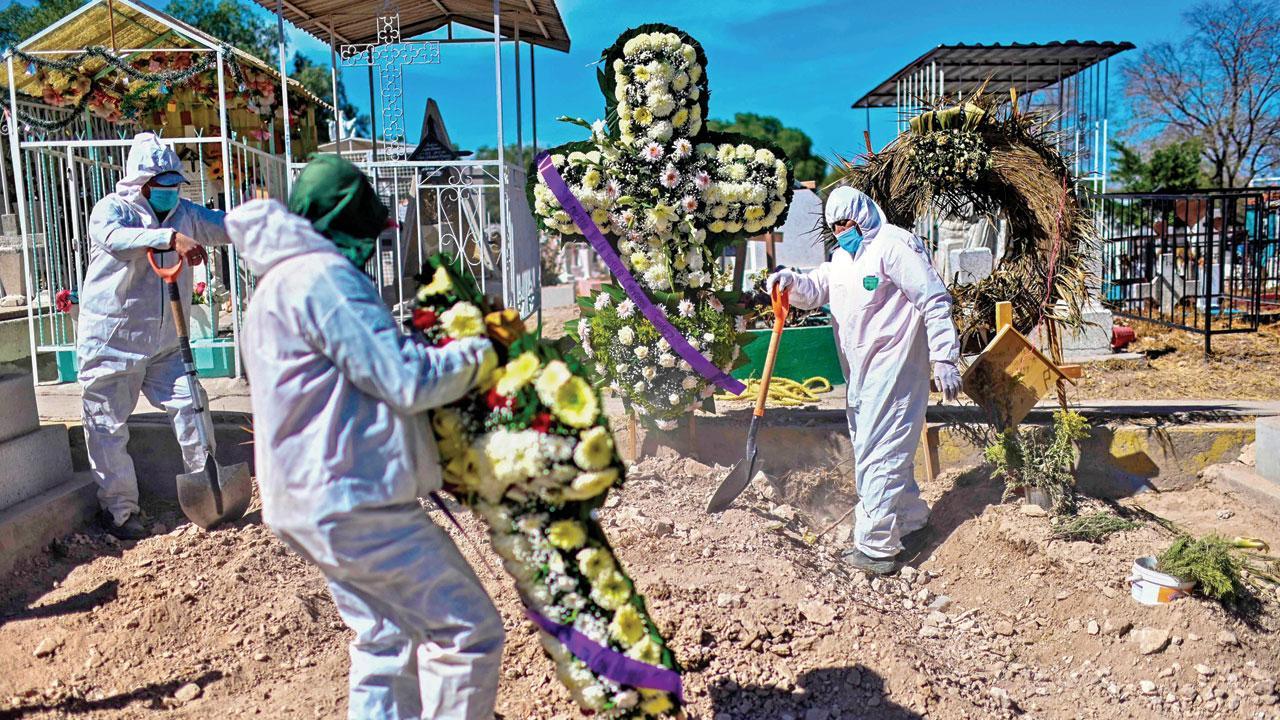With toll nearing 1,00,000, Africa CDC’s head says the death rate on the 54-nation continent is now 2.6 per cent while the global rate is 2.2 per cent

Gravediggers place flowers on the tomb of a COVID-19 victim at a cemetery in Mexico state on Tuesday. Mexico reported a near-record 1,707 deaths on Wednesday, as it runs out of Pfizer vaccines. PIC/AFP
The head of the Africa Centres for Disease Control and Prevention says the COVID-19 case fatality rate on the continent “is becoming very troubling” as it creeps ever higher than the global one. John Nkengasong told reporters that the fatality rate on the 54-nation continent is now 2.6 per cent while the global one is 2.2 per cent.
ADVERTISEMENT
Twenty African countries including South Africa, Sudan and Congo have rates higher than the global average as a resurgence of cases in parts of the continent has a far deadlier toll than the initial wave of infections last year. Africa’s confirmed deaths in the pandemic are approaching 1,00,000, with more than 3.6 million cases overall. Nkengasong says “it would be a tragedy if we begin to normalise these deaths.”
As COVID-19 vaccines finally begin to arrive on the continent, he says 16 countries have put in requests for a total of 114 million doses of the 670 million doses the African Union has secured from various sources. Nkengasong did not name the countries but said “we hope in the next two to three weeks they should be having their vaccines.”
‘Vaccine delay to further hit Mideast economy’
Broad access to different coronavirus vaccines remains crucial for an economic recovery in the Mideast, the International Monetary Fund said on Thursday, warning the path ahead remains “long and winding” for countries already struggling with corruption and debt. The IMF forecasts economic growth of 3.1 per cent in 2021 and 4.2 per cent in 2022 for the Mideast and North Africa. However, war-torn and debt-mired nations could be further hurt by a delayed rollout of vaccines. “This is a year of reset where we are in a race between the virus and the vaccine,” Jihad Azour, director of the Middle East and Central Asia department at the IMF, told The Associated Press. “This hinges on the speed of vaccination and the risks of a third wave of new mutations.”
Trial on mixing of Oxford, Pfizer jabs
Oxford University said on Thursday it will launch a medical trial alternating doses of COVID-19 vaccines created by different manufacturers, the first study of its kind.
The trial will show whether different COVID doses — created by the Astrazeneca and Pfizer/BioNTech firms — can be used interchangeably to allow greater flexibility in pressured vaccine delivery schedules.
 Subscribe today by clicking the link and stay updated with the latest news!" Click here!
Subscribe today by clicking the link and stay updated with the latest news!" Click here!







